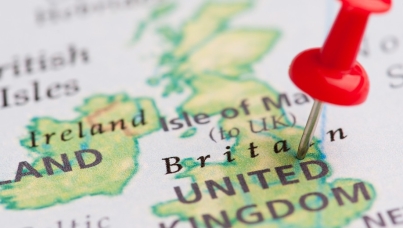Majority of Britons want political parties to take a strong approach to climate change – but it is unlikely to sway 2019 non-voters
New polling from Ipsos has revealed that while most Britons remain concerned about climate change, the intensity of concern has fallen since 2022 - mainly due to a fall in those at least very worried about the issue (from 45% to 37%). Those who voted Labour (50%) or Lib Dem (53%) at the last election tend to be more worried about climate change than those who voted Conservative (25%).
A majority (52%) of Britons would prefer political parties to take strong action to address climate change. Despite this, it is unlikely that the issue will sway those who did not vote in 2019. Research was conducted using Ipsos’ random probability online KnowledgePanel.
Concern about climate change
- While a clear majority (77%) of Britons are worried about climate change, this is mostly made up of people who are fairly worried (40%). Only 15% of people report being extremely worried, while 22% are not at all or not very worried.
- People who voted Labour (50%) or Lib Dem (53%) at the last election tend to be more worried (i.e. extremely or very worried) about climate change than those who voted Conservative (25%).
- However, there is a clear appetite for political leaders to take action on the issue, with a majority of Britons saying that they would be more likely to support a political party vowing to take stronger action on climate change (52%) than a party taking slower action (26%).
- 2019 Lib Dem voters are most likely to support strong action, (73%), followed by Labour (66%), and Conservatives (41%).
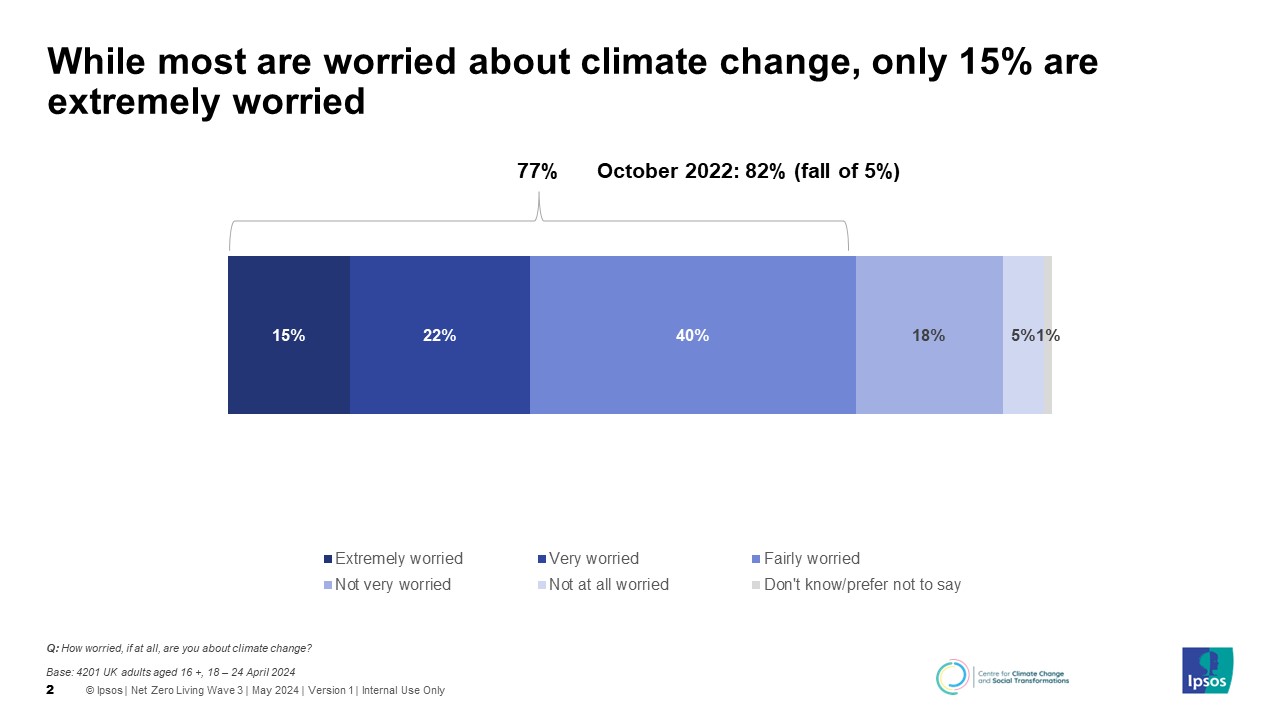
Support for net zero policies
- On balance, most net zero policies have more support from Britons than opposition. Support is highest for giving people more assistance to increase the energy efficiency of their homes (76%); frequent flyer levies (62%); and changing product pricing to reflect how environmentally friendly products are (56%). The exception is electric vehicle subsidies (39% support, 41% oppose).
- However, while most net zero policies continue to enjoy majority support among Britons, this support has fallen. Support for ensuring access to sustainable pension funds and increasing vegetarian/vegan options in food provisioning have both fallen by 8 points since 2022, support for creating low traffic neighbourhoods is down 7 points, and support for higher taxes on red meat and dairy products and electric vehicle subsidies are both down 6 ppts.
- Labour and Lib Dem 2019 voters support all policies, while past Conservative voters only support a few: frequent flyer levies, changing product pricing, ensuring access to sustainable pensions, and enabling people to make energy efficiency improvements to their home.
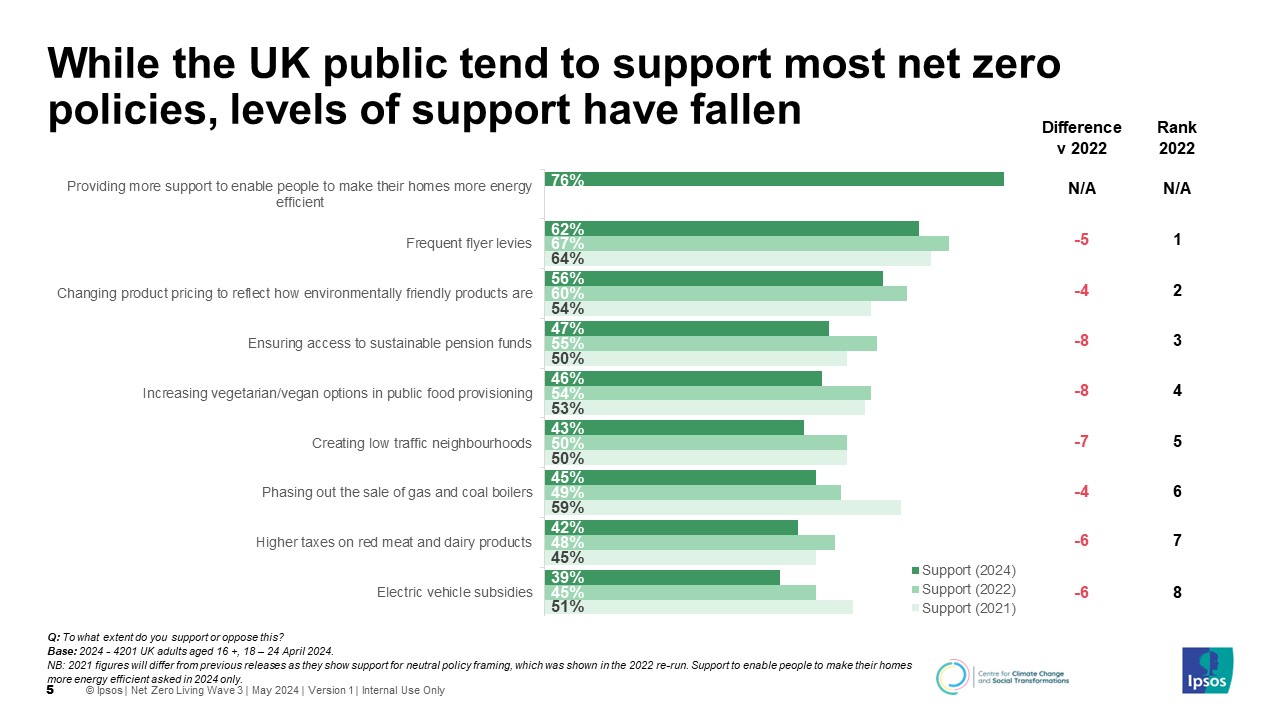
Government subsidies for net zero policies
- Regardless of past voting patterns, people support the provision of some form of government subsidy to help with the cost of net zero policies or the behaviour changes these would require.
- However, support for both universal and means tested subsidies is lower among 2019 Conservative voters (45% and 24% respectively) than those who voted Labour (53% and 33%) or Lib Dem (54% and 34%). More past Conservative voters say there should be no subsidies (20%) than past Labour or Lib Dem voters (both 6%).
Motivations behind behaviour changes
- Across the political spectrum, considering positive personal impacts tends to boost policy support, while considering negative personal impacts weakens policy support.
- However, providing more support for people to make their homes more energy efficient and changing product pricing are still supported by the majority of people, even after considering negative personal impacts.
- After considering the positive personal impacts of policies, past Conservative voters support all policies bar increasing vegan/vegetarian options in public food provisioning. After thinking about the negative impacts, they still support changing product pricing, ensuring access to sustainable pensions, and enabling people to make energy efficiency improvements to their home - policies they tended to support initially.
- Past Labour and Lib Dem voters would support all net zero policies even after considering the negative personal impacts.
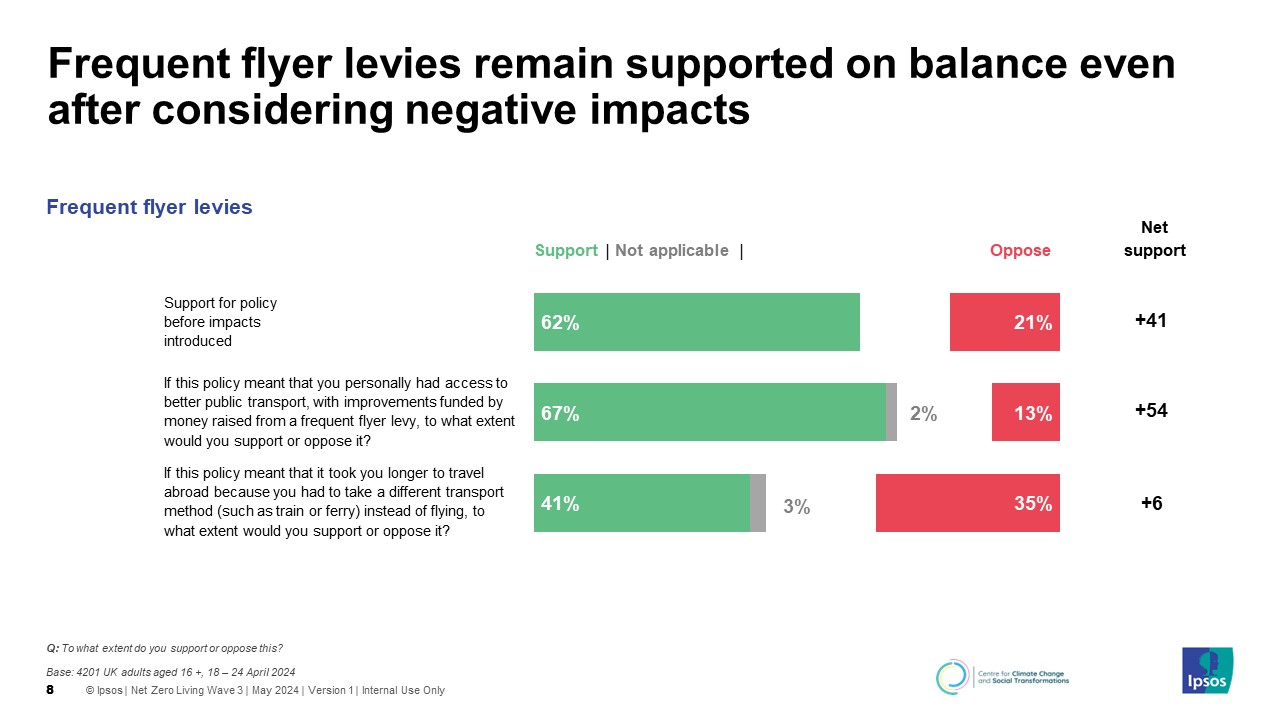
Overall, while we see lower support for enabling people to make their homes more energy efficient after people consider the positive personal impact compared to the negative personal impact, there is a larger proportion of people who say the positive impact is not applicable to them. This is likely due to this impact being about accessing cheaper mortgage rates by making homes more energy efficient, which will not be an impact of relevance to everyone.
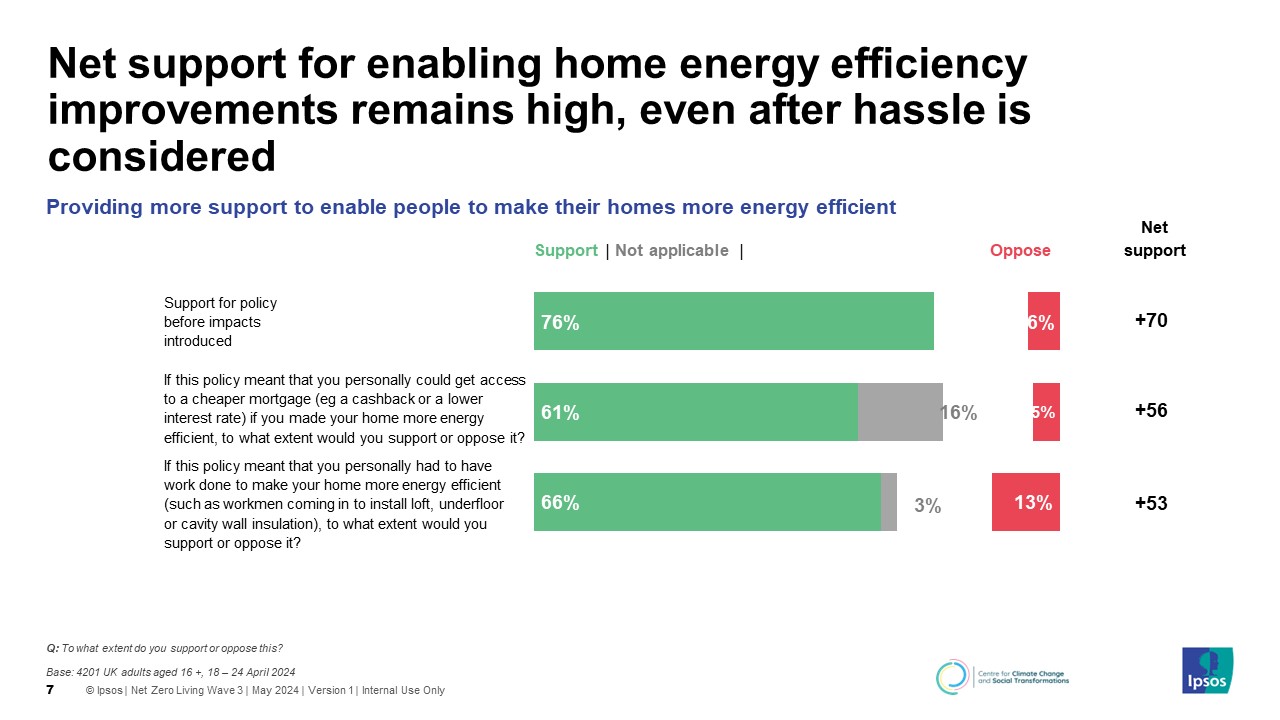
- Regardless of past voting patterns, regular flyers (those who fly every 2-3 months or more) are unlikely to reduce the amount they fly if alternatives are more expensive or will take longer. However, past Labour (53%) or Lib Dem (60%) voters who fly regularly would be more likely to reduce the number of flights they take if alternatives are cheaper than past Conservative voters who fly regularly (31%).
- Across the political spectrum, people who drive regularly (at least once a week) would be unlikely to reduce the number of journeys they take by car if alternatives were more expensive or took longer.
- However, where cost or time savings can be made, past Labour or Lib Dem voters who drive regularly would be likely to reduce the amount of driving they do; if alternatives were cheaper (Labour (50%), Lib Dem (52%), Conservative (32%)) or quicker (Labour (54%), Liberal Democrat (54%) Conservative (33%)). For past Conservative voters who drive regularly, on balance the personal benefits do not sway them to reduce their driving.
Sources of information
- Voters across the political spectrum tend to get their information on net zero policies from the same places (and the same places as the UK population as a whole) – but trust is a mixed picture.
- TV/radio news is the most common source of information (59%), followed by print media (36%). However, for past Conservative voters, UK Government departments is the third most common source, compared to social media for Labour or Lib Dem voters.
- When it comes to trust, while scientists and academics are the most trusted source for all voters, second and third place fluctuates depending on past voting. For past Labour voters, climate change charities and TV/radio news are the second and third most trusted sources. For past Lib Dem voters, it’s climate change charities and international organisations such as the European Union or United Nations. For past Conservative voters, trust TV/radio news and UK Government departments most.
2019 non-voters
- Pledges to strengthen action on climate change are unlikely to sway those who did not vote in 2019. This is because 2019 non-voters tend to have lower levels of concern about the climate (25% extremely or very worried) and are less likely than voters to choose a party taking strong action on the climate (40%).
- Support for net zero policies is also low among this group, often even lower than among those who voted Conservative at the last election. However, on balance they do support frequent flyer levies, increasing vegan/vegetarian options in public food provisioning, ensuring access to sustainable pensions, and enabling people to make energy efficiency improvements.
- The personal impact of net zero policies matters though. Considering the personal positive impacts of policies means that they support all net zero policies on balance, while considering the negative impacts means they oppose policies (except for those they initially supported overall: changing product pricing, ensuring access to sustainable pensions, and enabling people to make energy efficiency improvements).
- However, they are divided on whether personal benefits would lead them to change their flying or driving behaviours. Regular flyers who did not vote at the last election are unlikely to fly less if the alternatives are more expensive or take longer. They are split on whether or not they’d be likely to do so if the alternatives were cheaper (40% likely v 40% unlikely).
- Regular drivers who did not vote at the last election are also divided on whether they would be likely to drive less if alternatives were cheaper (43% likely v 40% unlikely) or quicker (39% likely v 40% unlikely). However, they would be unlikely to reduce driving if the alternatives were dearer or longer.
Rachel Brisley, Head of Energy and Environment at Ipsos said:
Concern about climate change appears to be softening somewhat, however over three quarters of the population are still worried. This means that that political parties should not shy away from the issue to win votes. On the contrary, we found that the majority of Britons want to see political parties taking a strong approach to tackling climate change.
However, it’s clear that while high levels of concern demonstrate support for political action in principle, public opinion is not completely set in stone. Both positive and negative personal consequences of Net Zero policies can shift opinion in both directions. This demonstrates how important it is to engage with the public about the wider benefits of net zero policies – especially when asking them to undertake significant behavioural shifts or shoulder cost implications – and provide support where necessary. It will also be particularly important for parties to engage on the issue with those who did not vote in 2019, who tend to be more sceptical of net zero policies.
Technical note:
- Survey data has been collected by Ipsos’s UK KnowledgePanel, an online random probability panel which provides gold standard insights into the UK population, by providing bigger sample sizes via the most rigorous research methods. Ipsos interviewed a representative sample of 4,201 adults aged 16+ in the UK between 18th and 24th April 2024.
- Data are weighted by age, gender, region, Index of Multiple Deprivation quintile, education, ethnicity and number of adults in the household in order to reflect the profile of the population of the UK. All polls are subject to a wide range of potential sources of error.
- Where percentages do not sum to 100 this may be due to computer rounding, the exclusion of “don’t know” categories, or multiple answers. Questions are asked of the total sample of n=4,201 unless otherwise stated.



